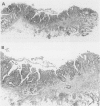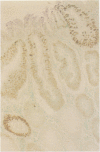Abstract
Mutations in oncogenes and tumour suppressor genes may have an important oncogenic role. Although flat type tumours have been frequently detected in recent years, ras and p53 expressions have not been studied in these tumours. Using a monoclonal and polyclonal antibody to the ras p21 and p53 product, paraffin wax embedded sections of 98 colorectal tumours (43 cases of the flat type colorectal tumour and 55 cases of polypoid type tumour) were stained using the immunoperoxidase technique. Staining was evaluated by light microscopic examination. Positive staining rate of ras p21 for the flat type was 0%; for the polypoid type, it was 60% in cancer with submucosal invasion, 82% in adenoma with high grade dysplasia, and 0% in adenoma with low grade dysplasia. The positive staining rate of p53 for the flat type was 50% in submucosal cancer, 9% in adenoma with high grade dysplasia, and 0% in adenoma with low grade dysplasia. For the polypoid type, it was 40% in submucosal cancer, 12% in adenoma with high grade dysplasia, and 0% in adenoma with low grade dysplasia. The intermediate staining rate of p53 in the polypoid type was 20% in submucosal cancer and 41% in adenoma with high grade dysplasia. It was seen that p53 was commonly expressed in both flat and polypoid lesions, p21 was not expressed in flat lesions, whereas it was commonly expressed in polypoid neoplasms. In the flat type cancer, a genetic change different from that of the polypoid type cancer is suggested.
Full text
PDF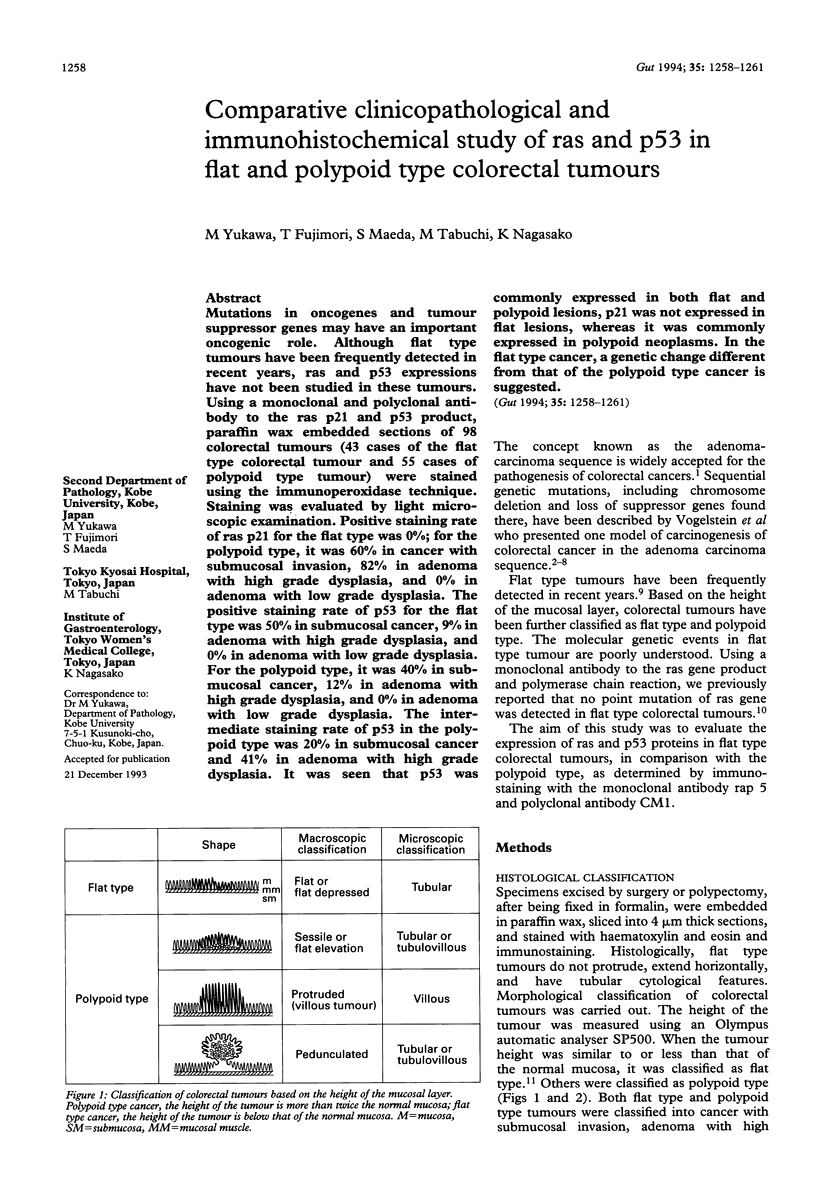

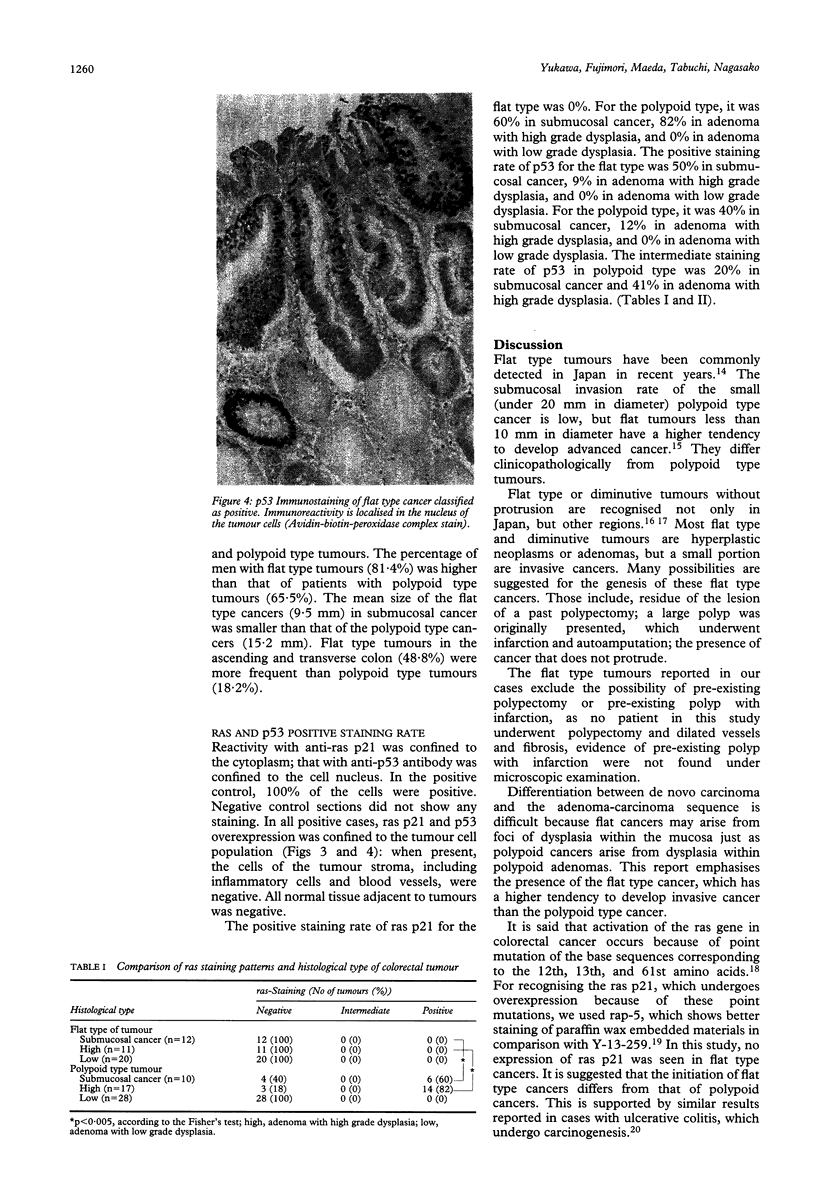
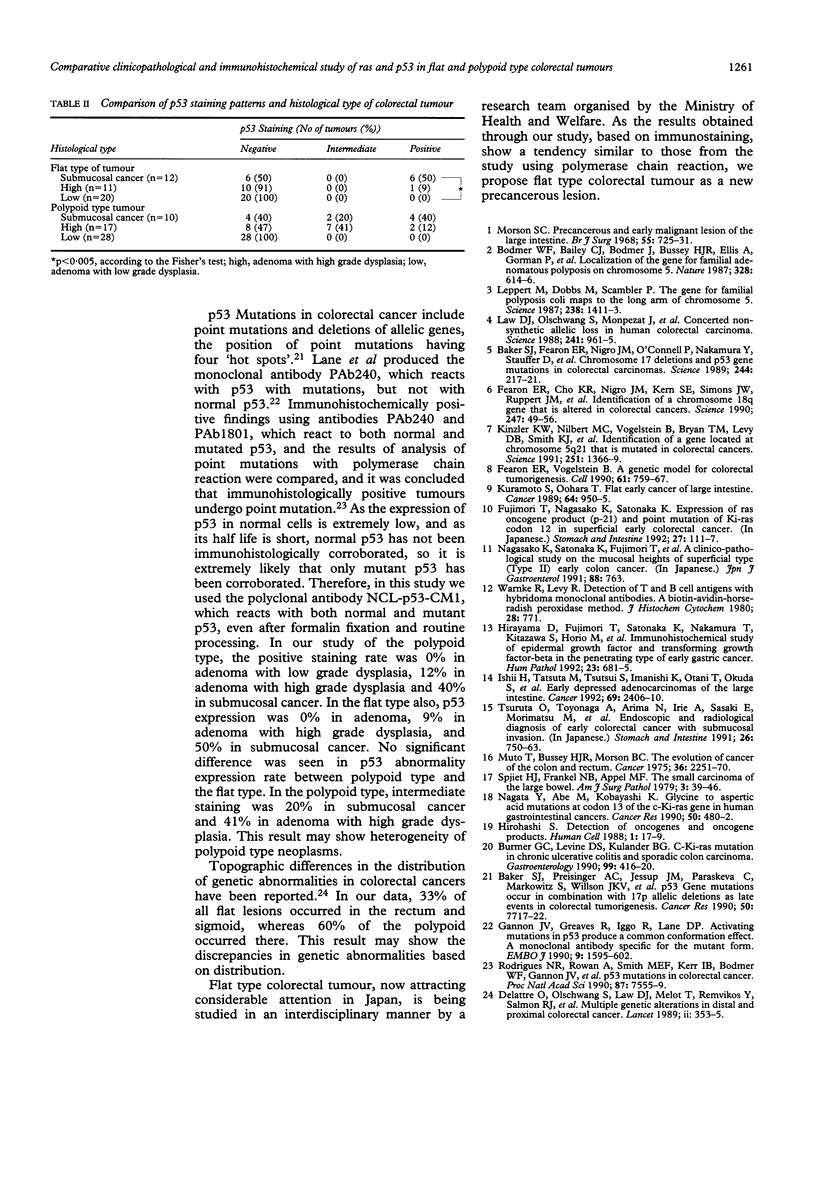
Images in this article
Selected References
These references are in PubMed. This may not be the complete list of references from this article.
- Baker S. J., Fearon E. R., Nigro J. M., Hamilton S. R., Preisinger A. C., Jessup J. M., vanTuinen P., Ledbetter D. H., Barker D. F., Nakamura Y. Chromosome 17 deletions and p53 gene mutations in colorectal carcinomas. Science. 1989 Apr 14;244(4901):217–221. doi: 10.1126/science.2649981. [DOI] [PubMed] [Google Scholar]
- Baker S. J., Preisinger A. C., Jessup J. M., Paraskeva C., Markowitz S., Willson J. K., Hamilton S., Vogelstein B. p53 gene mutations occur in combination with 17p allelic deletions as late events in colorectal tumorigenesis. Cancer Res. 1990 Dec 1;50(23):7717–7722. [PubMed] [Google Scholar]
- Bodmer W. F., Bailey C. J., Bodmer J., Bussey H. J., Ellis A., Gorman P., Lucibello F. C., Murday V. A., Rider S. H., Scambler P. Localization of the gene for familial adenomatous polyposis on chromosome 5. Nature. 1987 Aug 13;328(6131):614–616. doi: 10.1038/328614a0. [DOI] [PubMed] [Google Scholar]
- Burmer G. C., Levine D. S., Kulander B. G., Haggitt R. C., Rubin C. E., Rabinovitch P. S. c-Ki-ras mutations in chronic ulcerative colitis and sporadic colon carcinoma. Gastroenterology. 1990 Aug;99(2):416–420. doi: 10.1016/0016-5085(90)91024-z. [DOI] [PubMed] [Google Scholar]
- Delattre O., Olschwang S., Law D. J., Melot T., Remvikos Y., Salmon R. J., Sastre X., Validire P., Feinberg A. P., Thomas G. Multiple genetic alterations in distal and proximal colorectal cancer. Lancet. 1989 Aug 12;2(8659):353–356. doi: 10.1016/s0140-6736(89)90537-0. [DOI] [PubMed] [Google Scholar]
- Fearon E. R., Cho K. R., Nigro J. M., Kern S. E., Simons J. W., Ruppert J. M., Hamilton S. R., Preisinger A. C., Thomas G., Kinzler K. W. Identification of a chromosome 18q gene that is altered in colorectal cancers. Science. 1990 Jan 5;247(4938):49–56. doi: 10.1126/science.2294591. [DOI] [PubMed] [Google Scholar]
- Fearon E. R., Vogelstein B. A genetic model for colorectal tumorigenesis. Cell. 1990 Jun 1;61(5):759–767. doi: 10.1016/0092-8674(90)90186-i. [DOI] [PubMed] [Google Scholar]
- Gannon J. V., Greaves R., Iggo R., Lane D. P. Activating mutations in p53 produce a common conformational effect. A monoclonal antibody specific for the mutant form. EMBO J. 1990 May;9(5):1595–1602. doi: 10.1002/j.1460-2075.1990.tb08279.x. [DOI] [PMC free article] [PubMed] [Google Scholar]
- Hirayama D., Fujimori T., Satonaka K., Nakamura T., Kitazawa S., Horio M., Maeda S., Nagasako K. Immunohistochemical study of epidermal growth factor and transforming growth factor-beta in the penetrating type of early gastric cancer. Hum Pathol. 1992 Jun;23(6):681–685. doi: 10.1016/0046-8177(92)90325-w. [DOI] [PubMed] [Google Scholar]
- Hirohashi S. [Analysis of oncogene and its expression at cellular level]. Hum Cell. 1988 Mar;1(1):17–19. [PubMed] [Google Scholar]
- Iishi H., Tatsuta M., Tsutsui S., Imanishi K., Otani T., Okuda S., Ishiguro S., Taniguchi H. Early depressed adenocarcinomas of the large intestine. Cancer. 1992 May 15;69(10):2406–2410. doi: 10.1002/1097-0142(19920515)69:10<2406::aid-cncr2820691004>3.0.co;2-e. [DOI] [PubMed] [Google Scholar]
- Kinzler K. W., Nilbert M. C., Vogelstein B., Bryan T. M., Levy D. B., Smith K. J., Preisinger A. C., Hamilton S. R., Hedge P., Markham A. Identification of a gene located at chromosome 5q21 that is mutated in colorectal cancers. Science. 1991 Mar 15;251(4999):1366–1370. doi: 10.1126/science.1848370. [DOI] [PubMed] [Google Scholar]
- Kuramoto S., Oohara T. Flat early cancers of the large intestine. Cancer. 1989 Aug 15;64(4):950–955. doi: 10.1002/1097-0142(19890815)64:4<950::aid-cncr2820640430>3.0.co;2-o. [DOI] [PubMed] [Google Scholar]
- Law D. J., Olschwang S., Monpezat J. P., Lefrançois D., Jagelman D., Petrelli N. J., Thomas G., Feinberg A. P. Concerted nonsyntenic allelic loss in human colorectal carcinoma. Science. 1988 Aug 19;241(4868):961–965. doi: 10.1126/science.2841761. [DOI] [PubMed] [Google Scholar]
- Leppert M., Dobbs M., Scambler P., O'Connell P., Nakamura Y., Stauffer D., Woodward S., Burt R., Hughes J., Gardner E. The gene for familial polyposis coli maps to the long arm of chromosome 5. Science. 1987 Dec 4;238(4832):1411–1413. doi: 10.1126/science.3479843. [DOI] [PubMed] [Google Scholar]
- Morson B. C. Precancerous and early malignant lesions of the large intestine. Br J Surg. 1968 Oct;55(10):725–731. doi: 10.1002/bjs.1800551003. [DOI] [PubMed] [Google Scholar]
- Muto T., Bussey H. J., Morson B. C. The evolution of cancer of the colon and rectum. Cancer. 1975 Dec;36(6):2251–2270. doi: 10.1002/cncr.2820360944. [DOI] [PubMed] [Google Scholar]
- Nagasako K., Satonaka K., Hirayama D., Fujimori T., Maeda S. [A clinico-pathological study on the mucosal heights of superficial type (type II) early colon cancer]. Nihon Shokakibyo Gakkai Zasshi. 1991 Mar;88(3):763–763. [PubMed] [Google Scholar]
- Nagata Y., Abe M., Kobayashi K., Yoshida K., Ishibashi T., Naoe T., Nakayama E., Shiku H. Glycine to aspartic acid mutations at codon 13 of the c-Ki-ras gene in human gastrointestinal cancers. Cancer Res. 1990 Feb 1;50(3):480–482. [PubMed] [Google Scholar]
- Rodrigues N. R., Rowan A., Smith M. E., Kerr I. B., Bodmer W. F., Gannon J. V., Lane D. P. p53 mutations in colorectal cancer. Proc Natl Acad Sci U S A. 1990 Oct;87(19):7555–7559. doi: 10.1073/pnas.87.19.7555. [DOI] [PMC free article] [PubMed] [Google Scholar]
- Spjut H. J., Frankel N. B., Appel M. F. The small carcinoma of the large bowel. Am J Surg Pathol. 1979 Feb;3(1):39–46. doi: 10.1097/00000478-197902000-00005. [DOI] [PubMed] [Google Scholar]
- Warnke R., Levy R. Detection of T and B cell antigens hybridoma monoclonal antibodies: a biotin-avidin-horseradish peroxidase method. J Histochem Cytochem. 1980 Aug;28(8):771–776. doi: 10.1177/28.8.7003003. [DOI] [PubMed] [Google Scholar]



